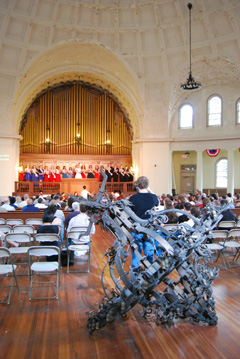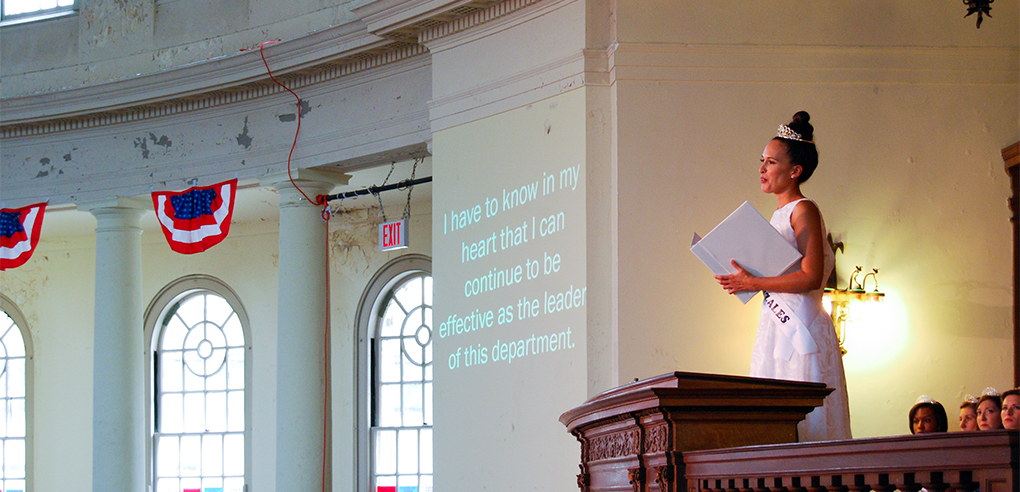This past Sunday the Philadelphia Fringe Festival featured the final of three performances of the Gonzales Cantata, a choral rendition of the Senate Judiciary Committee hearings of former Attorney General Alberto Gonzales. (For pictures of the final performance see my earlier post.)
Once you get beyond the bizarre concept (an operatic work with a libretto taken from Senate hearings) and the media hype (with coverage from Fox News to the Rachel Maddow Show) and the quirky advertising (with posters of Senator Arlen Spector wearing earrings and Alberto Gonzales in a tiara) — once you get past all that, it turns out the Gonzales Cantata is a powerful and moving work. Written by Melissa Dunphy while she was an undergraduate student at West Chester University, the piece is a surprisingly nuanced exploration of personal tragedy and ethical lapses in American politics.
The work switches the genders of the performers and the characters they portray (hence the earrings and tiara in the posters of the male protagonists). This was done, we are told, “in protest of the continued male domination of American politics.” Political motivations aside, the gender reversals work well musically, with the central roles of Alberto Gonzales played by soprano Mary Thorne and Senator Patrick Leahy sung by coloratura soprano Jessica Lennick.
The multifaceted tone of the afternoon’s performance was established at the outset. Before beginning the cantata, it was announced that we would first hear a performance of “three patriotic songs.” Knowing that Dunphy had previously attempted to do an arrangement of former Attorney General John Ashcroft’s “Let the Eagle Soar” — Ashcroft declined Dunphy’s request — I was primed for ironic parodies of American tunes. When countertenor Nicholas Tamagna opened with a tender and beautiful rendition of “America the Beautiful,” it was clear the afternoon’s entertainment would include unexpected moments. The rousing rendition of Souza’s “Stars and Stripes Forever” that followed seemed well suited to the arrangement for countertenor, harpsichord, and piccolo . (For my money, the piccolo part in Souza’s classic arrangement has always been the highlight of this song). For the third song, a performance of the unctuously patriotic “God Bless the USA” let us know that irony would not be entirely absent from the afternoon’s festivities.
The cantata itself similarly moved between broad humor and poignant reflection. Much of the tone is, indeed, satirical. At times the work is laugh-out-loud funny, such as when soprano Mary Thorne as Gonzales sings “I don’t recall” 72 times (as the real Gonzales declared in one session before Congress) while a projector displays the current tally of the denials.
Ultimately, however, the cantata evokes a sense of sadness. Taken in its entirety, Dunphy’s work is more tragedy than comedy, as it seeks to uncover a sense of meaning and humanity within this dark moment in American politics.
The overall tone of the piece brings to mind Sam Mendes’ 1999 film “America Beauty” based on the screenplay by Alan Ball. While both works are rife with satire, they are also meditations on the emptiness and cynicism of contemporary America.

The venue — the Rotunda at the edge of the University of Pennsylvania campus in West Philadelphia — was a great surprise. I had passed by his old and disheveled building countless times, but had never given it much thought. Inside, its classical architecture (with a dome that vaguely resembles Rome’s Pantheon) befits the Senatorial proceedings. The peeling paint and decaying ceiling provide the requisite “crumbling empire” feel. And the fallen chandelier in the middle of the floor (which I don’t believe was placed there for effect) adds a certain sense of Phantom-of-the-Opera-esque Grand Guignol to the setting.
Given the rundown appearance of the hall, its acoustics were surprisingly good. The vocals were clear with just a touch of reverb to expand the operatic sound. The performances by vocalists and instrumentalists alike were all first rate (and generally an improvement — particularly instrumentally — over those on the recording available on CD and from Dunphy’s web site).
The Gonzales Cantata is an eloquent and powerful work. I entered the auditorium expecting a cynical farce. I left with the realization that Dunphy has created a thoughtful and moving musical reflection on recent American history.
For those who missed the three performances this past weekend, an earlier recording of the work is available on Dunphy’s Bandcamp page and linked from the Gonzales Cantata web site: http://www.gonzalescantata.com/
This fall Ms. Dunphy begins work on her doctorate in musical composition at the University of Pennsylvania. I can’t wait to hear what she does next.

I’m sorry I missed it, it sounds like quite a show! Due to weddings and baby showers and such, I couldn’t attend any Fringe shows this year.
The Rotunda is a great venue, I’ve seen a lot of good (and free!) music there over the years. They are celebrating their 10th Anniversary of hosting performances the weekend of September 25th. Details can be found here, for anyone interested:
http://www.facebook.com/event.php?eid=135856772740
Regards,
-Tim
LikeLike
Oh I am sorry indeed I missed this one. Good for you for ferreting it out.
I cannot only do so many cultural thangs at one time, and therefore merely must be content with my encounter with Spike Lee: http://www.facebook.com/home.php#/photo.php?pid=38520884&op=1&o=global&view=global&subj=1043720715&id=610381 – extra short Rosie hair by Katie of Hair Cuttery/Ardmore).
BTW, you have to do something on here with / about this guy, Jake Tlison: http://www.jaketilson.com/. I am reading his 12 Kitchens right now. Truly, one of the big brains.
LikeLike